Forge Motorsport Intercooler for VW Golf MK8/Audi S3 – FMINT24
د.إ4,190.00
Upon placing the order, we will get in touch with you to confirm the availability information.
For Instant Enquiry and More Details, Please Click Here
Did you like this product? Add to favorites now and follow the product.
Description
FMINT24 is a performance intercooler for the MQB platforms with the EA888 GEN4 Engine. Produced, designed, and tested, at our headquarters in Gloucester UK. Throughout the development process we have strived to improve the efficiency and performance of the EA888 GEN4 engine. Our project brief was to develop an intercooler that utilised all of the available space in the original position of the OEM intercooler, and to ensure the inlet air temperature is reduced, without any negative effects on the boost pressure or engine and transmission cooling.
In the MQB chassis the intercooler housing is particularly restricted and confined to a small amount of space, due to it not only housing the intercooler, but also the radiator and air conditioning condenser. The front panel in theory is a sandwich pack that houses the auxiliary cooling components. This means in order to increase the size of the intercooler without paying detriment to the performance of the surrounding items, and with also having very little extra space available, that it can be very difficult to execute the perfect blend of a high flow intercooler within such a close proximity.
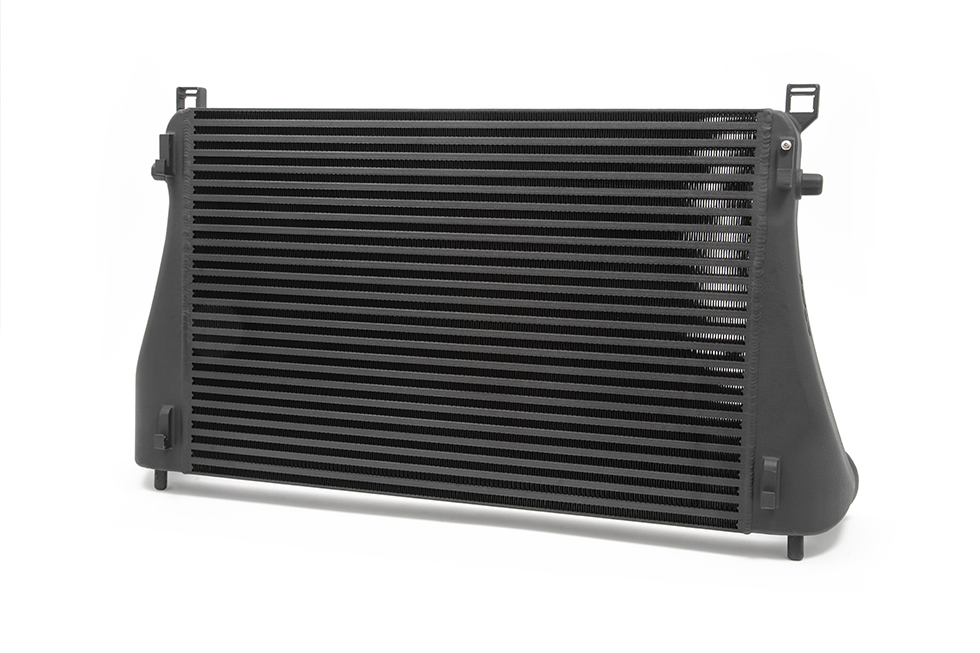
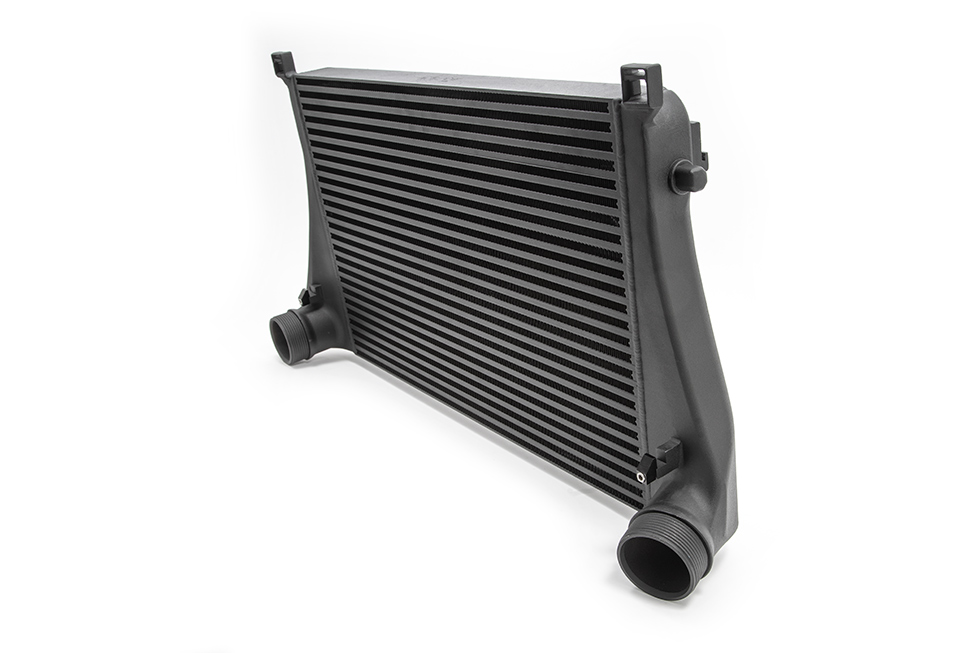
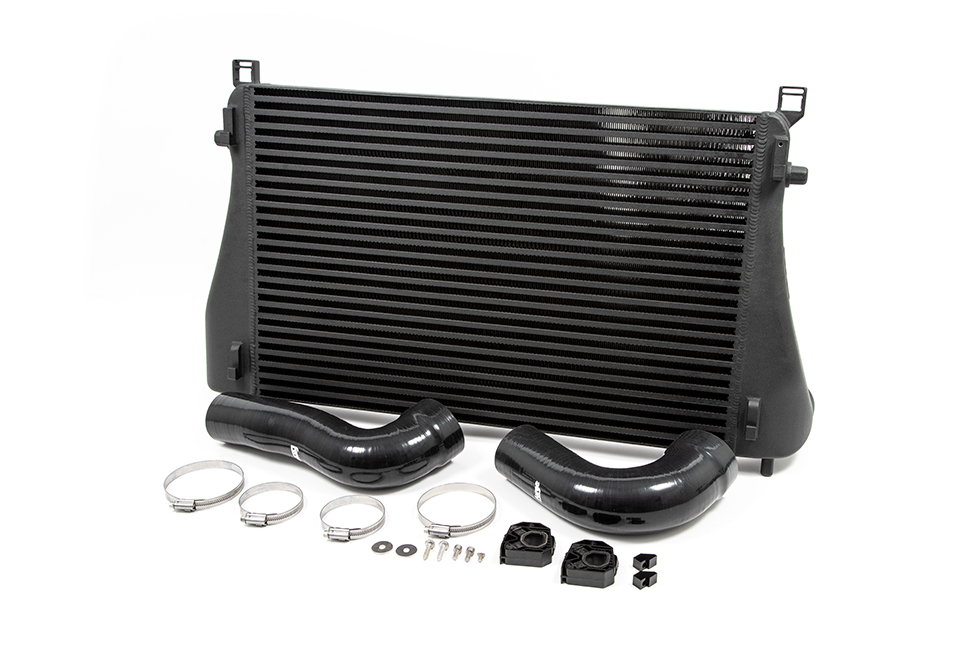
Our research and development engineers started with a brief to fit our existing intercooler (FMMK7FMIC) that was for the MK7 platform, to our development VW MK8 Golf R. Upon installation, we then tried to establish if we could re-engineer the intercooler with an increased inlet and outlet size along with increasing the volumetric capacity to increase flow along with future proofing the design to work well with highly tuned stage 3 plus EA888 Gen 4 engines.
Using a combination of scanning software and traditional measuring methods, the design was created. This was then fine-tuned by our flow dynamics simulations programs (CFD), and the end tanks were initially created by 3D printers. This enabled us to ensure the fit was perfect on the vehicle before any prototype castings or machined billet end tanks were produced ready for dyno testing.
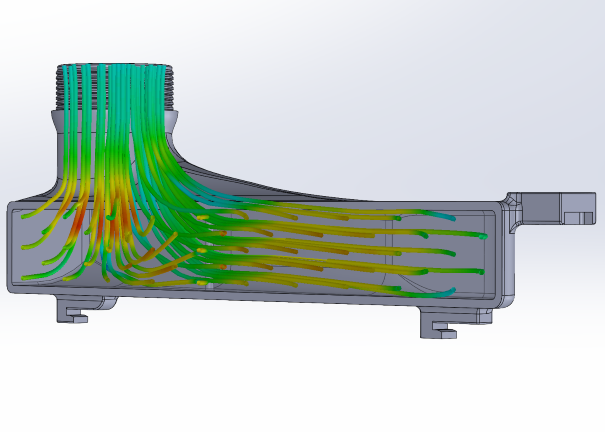
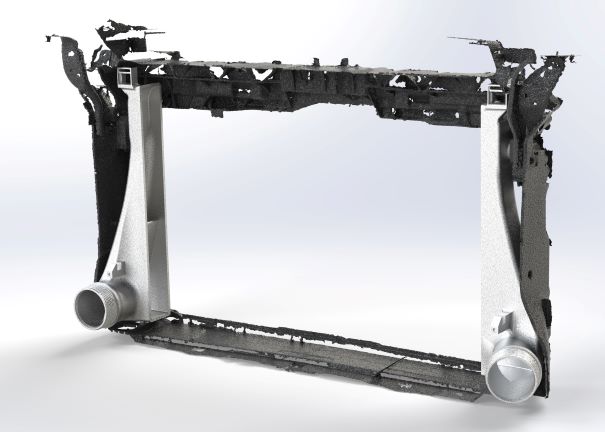
Several baffle configurations were designed, and flow simulated to ensure the maximum performance was obtained to keep the core working at its optimum, along with ensuring all its cooling capabilities had been upheld, and that the total volume of the core internal is utilised for optimum performance.
With an increase in inlet and outlet sizes, we then turned our attention to the design of our silicone hoses. With flow in mind, we have created a step within the hose so where the hose meets the hot and cold side of the inlet and outlet junctions the transition is seamless, this helps to lesson any disturbance to the airflow and prevent unwanted turbulence. To further aid with flow, the inlet and outlets have been increased to 76mm from the OEM size of 63mm which equates to a 45% increase in surface area.
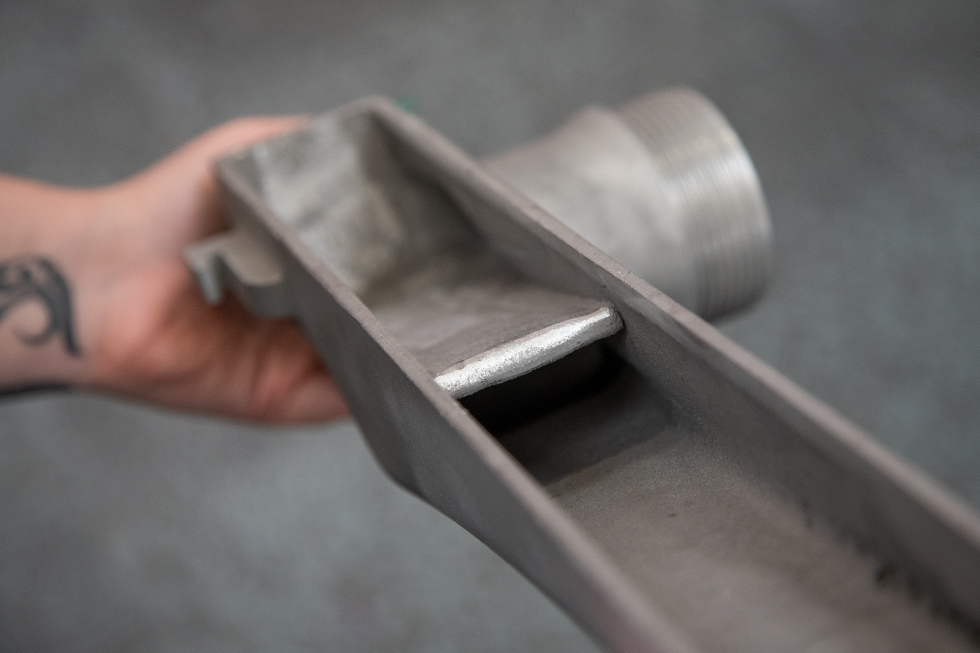
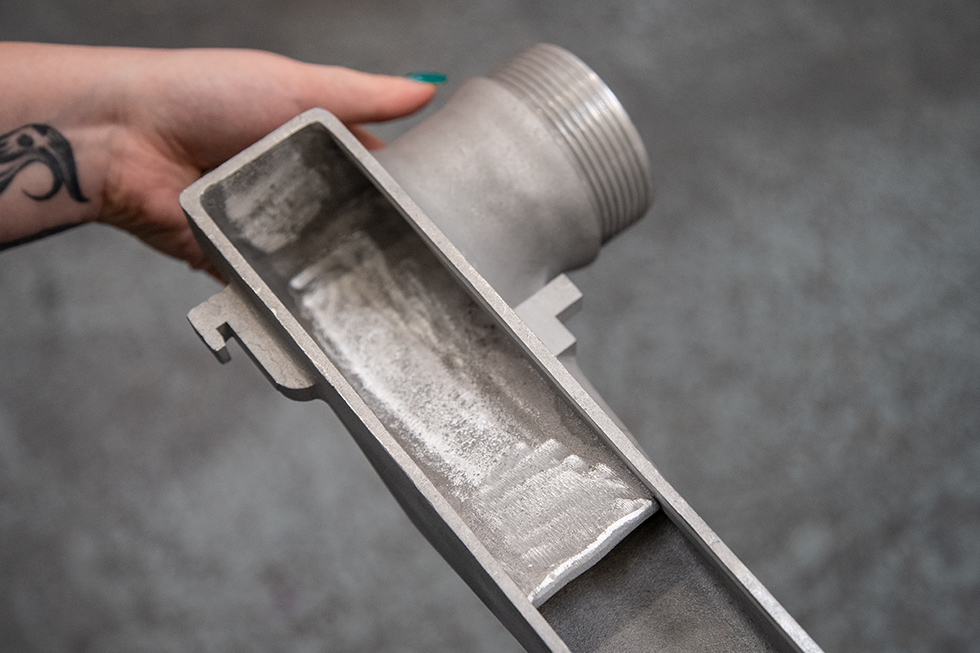
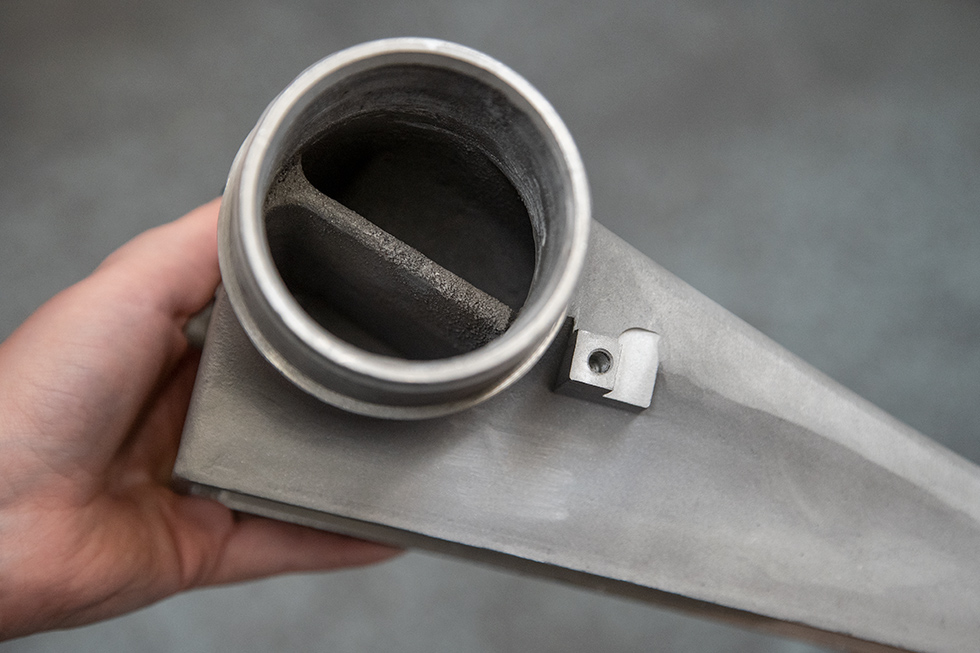
The consideration of space and our clever design has led us to produce several intercooler cores with different fin configurations and internal capacities. Depending on the core design, testing results led us to choose a bar and plate design with over 83% more volume than the OEM intercooler, and with a frontal area increase of 10%.

Why do we test different cores?
Here at Forge Motorsport, when developing an intercooler, we will test several different cores for each application. For example, a bar and plate style core, a tube and fin style core along with different fin pitches and heights, as well as changing the internal fin pitches/shapes and density within the tube; thus enabling us to fine tune the amount of pressure drop the intercooler produces. Pressure drop is not always a bad thing, as our testing and research has proven on various projects. This is because the pressurized air velocity is being stalled by the pressure drop within the cooler thus allowing more time to cool the air within the cooler itself, as air passes through the non-pressurized face of the core, that is open to the atmosphere.
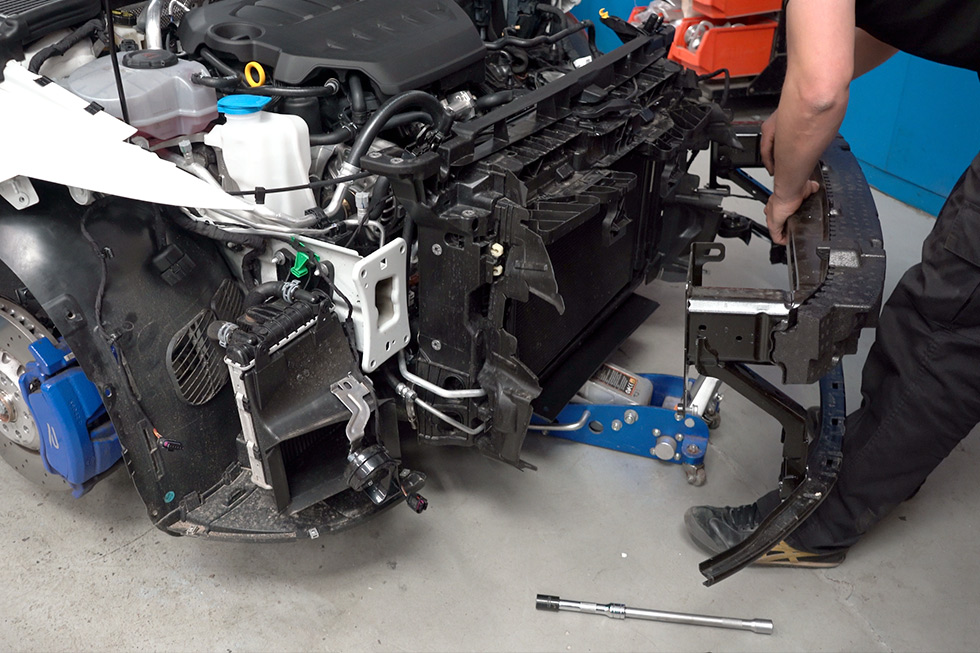
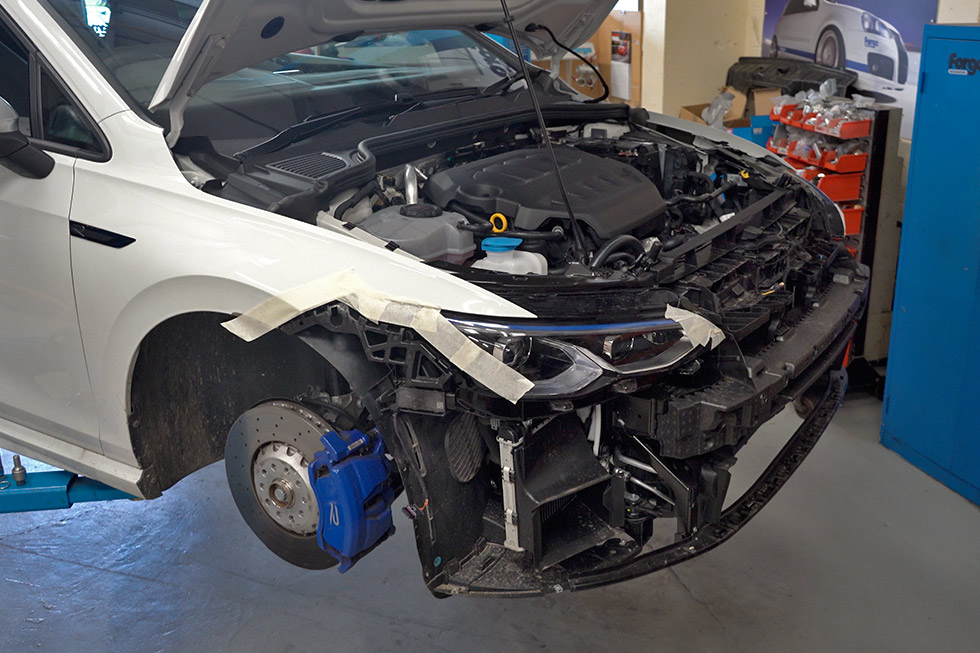
Too much pressure drop can of course have a problem on the higher performance engines as the intercooler reaches its maximum efficiency the turbo has to work a lot harder to force the air through the core. This in turn creates higher inlet air temps (IAT’s) due to the turbo creating more heat as it is over stressed and worked harder. No pressure drop can also prove to be inefficient as the cooler will not lower the charge temperature again resulting in higher inlet air temperatures.

Dyno Results
Testing was completed using Performance Remap in Gloucester with their VTEC 4-wheel drive dynamometer. This was to ensure all our data has been achieved with results as accurately as possible by an independent tuner. As you can see from the dyno results below, peak power was increased from stock by 11bhp and 20nm of torque at 5500RPM with the Forge Motorsport performance intercooler installed.
The best news is that there are significant torque gains throughout the rev range, meaning that the car power will pick up quicker and pull the whole way through to redline, including an impressive gain in BHP from 5000 RPM TO 6500 RPM. Gains on vehicles with re calibrated software and further hardware performance parts can be expected to be a lot higher due to the substantial drop in IATS when FMINT24 is installed.
During our extensive testing, we let the car heat soak on the dyno until the radiator fans tripped on and off (which gives an inlet temperature of around 40°C). We then did a dyno pull from this point which gives a more consistent result and reflects real-world driving conditions more accurately. You can easily see the Forge intercooler cools much quicker and delivers a much greater drop in temperature compared to OEM.
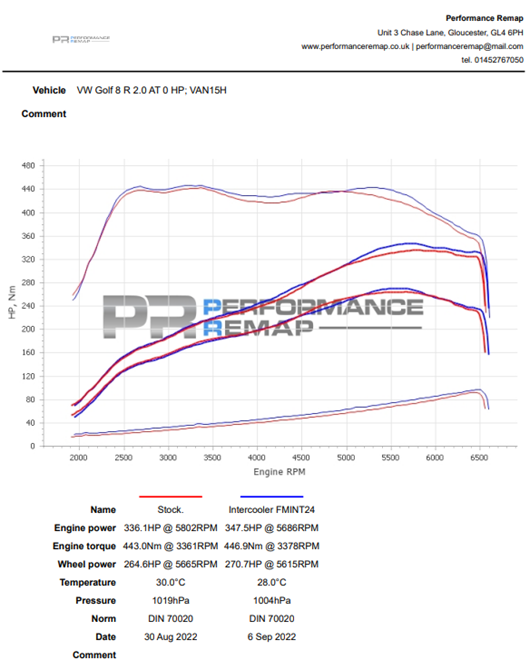
After more than six pulls on the dyno we still had super safe IAT’s, and the Forge Motorsport intercooler gave results of 34°C at 6548 RPM giving a reduction of 58% over the factory’s intercooler intake temps from 58°C at 6508 RPM. These tests took place in relatively hot conditions with an ambient dyno cell temperature of 23°C proving how inefficient the stock intercooler is.
In the summer months, the stock intercooler along with higher inlet air temperatures will have a hugely negative impact on the engine’s performance. In these conditions, the engine management will retard the ignition, resulting in a lower powered engine as temperatures rise and the ECU then pulls out the timing to stop detonation. On a mapped vehicle, the results will be even more detrimental and can lead to possible premature engine wear. If you use your car for fast road or have a high-performance tune in a hot climate, this product is essential.
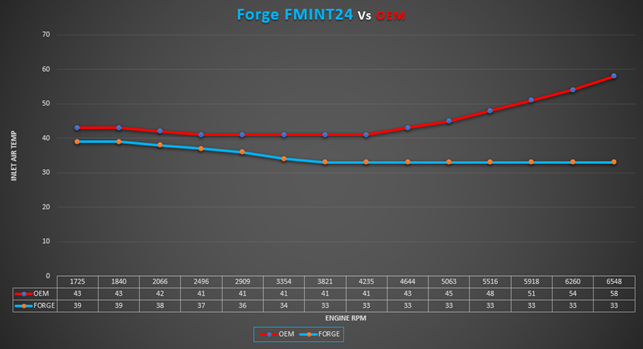

Why do we try to decrease IAT’s? (Inlet Air Temperature)
Temperature and volume of air supplied to your vehicles engine that is compressed by the turbo charger has a better effect on performance when cool as this is to provide the engine with more oxygen (denser air), thus improving the combustion in each cylinder. In addition, by regulating and reducing the air temperature, it also increases the reliability of an engine by keeping the AFRs (Air Fuel Ratios) in each cylinder at a safe level, which in turn, can increase an engines power due to the air being cooler. A bigger bang is then created within the cylinder, providing the correct amount of fuel is added. This can equate to an increase in BHP and torque.

The Forge Motorsport intercooler is a perfect performance enhancing product that fits directly to the OEM mounting points, making for an easy install, in a relatively short period of time. No cutting of any components is needed, making the installation reversible if the vehicle needs to be returned to stock at any time in the future. The core and end tanks are finished in our black textured anti corrosion coating that also aids with its thermal properties and keeps the product looking that bit stealthier or OEM+.
The Forge Motorsport lifetime warranty on all hardware products shows the trust we have in the quality of our products while they are being enjoyed on your pride and joy.
Compatible Vehicles :
Additional information
| Brand | Forge Motorsport |
|---|---|
| Make | Audi, Golf GTI, Golf R, S3, Volkswagen |
| Model Year | 2020, 2021, 2022, 2023 |
Quick Comparison
| Settings | Forge Motorsport Intercooler for VW Golf MK8/Audi S3 - FMINT24 remove | CTS TURBO MK8 GOLF R/ AUDI 8Y S3 TURBO OUTLET PIPE -CTS-IT-956 remove | CTS TURBO MK7/7.5 THROTTLE PIPE (GTI/GOLF R/GOLF GTI/A3/S3/TT) 2015+ MQB MODELS -CTS-IT-280 remove | RACINGLINE OIL COOLER SYSTEM 2.0 TSI EA888 Gen.3 ENGINES – VWR18G700 remove | BLACK BOOST MERCEDES AMG M156/M159 RACING COOLANT THERMOSTAT -BBTMT001 remove | Snow Performance - Boost Cooler Stage 2E Power-Max - SP10250 remove | |||||||||||||||||||||||||||||||||||||||||||||||||||||||||||||||||||||
|---|---|---|---|---|---|---|---|---|---|---|---|---|---|---|---|---|---|---|---|---|---|---|---|---|---|---|---|---|---|---|---|---|---|---|---|---|---|---|---|---|---|---|---|---|---|---|---|---|---|---|---|---|---|---|---|---|---|---|---|---|---|---|---|---|---|---|---|---|---|---|---|---|---|---|---|
| Name | Forge Motorsport Intercooler for VW Golf MK8/Audi S3 - FMINT24 remove | CTS TURBO MK8 GOLF R/ AUDI 8Y S3 TURBO OUTLET PIPE -CTS-IT-956 remove | CTS TURBO MK7/7.5 THROTTLE PIPE (GTI/GOLF R/GOLF GTI/A3/S3/TT) 2015+ MQB MODELS -CTS-IT-280 remove | RACINGLINE OIL COOLER SYSTEM 2.0 TSI EA888 Gen.3 ENGINES – VWR18G700 remove | BLACK BOOST MERCEDES AMG M156/M159 RACING COOLANT THERMOSTAT -BBTMT001 remove | Snow Performance - Boost Cooler Stage 2E Power-Max - SP10250 remove | |||||||||||||||||||||||||||||||||||||||||||||||||||||||||||||||||||||
| Image | 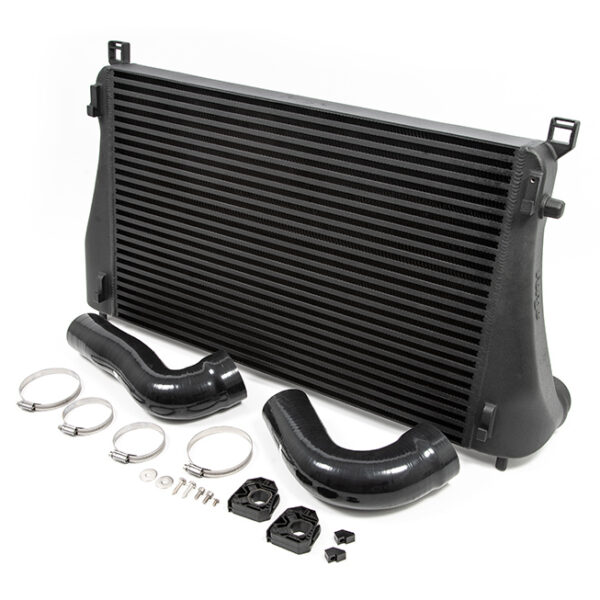 | 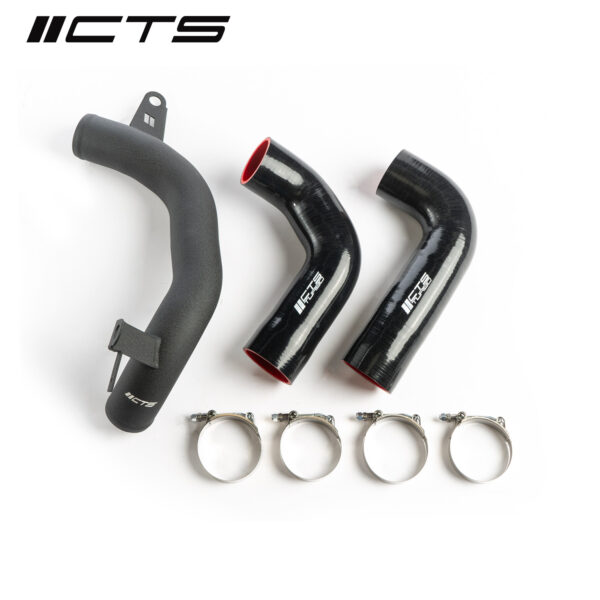 |  | 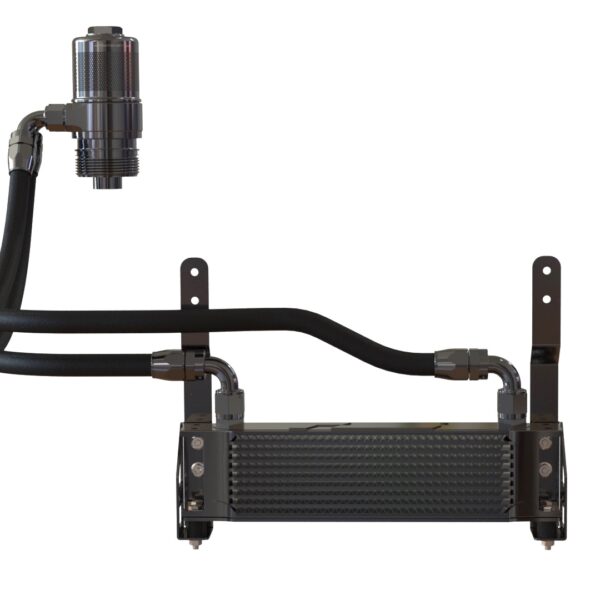 | 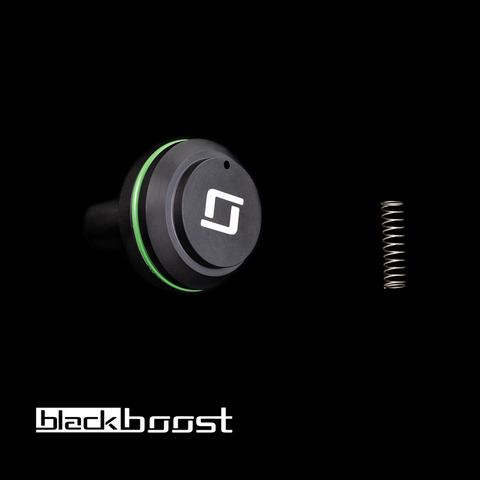 | 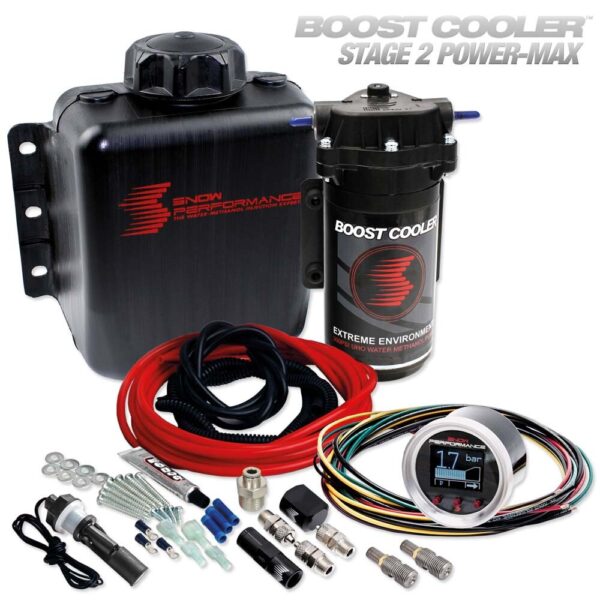 | |||||||||||||||||||||||||||||||||||||||||||||||||||||||||||||||||||||
| SKU | FMINT24 | CTS-IT-956 | CTS-IT-280 | VWR18G700 | BBTMT001 | SP10250 | |||||||||||||||||||||||||||||||||||||||||||||||||||||||||||||||||||||
| Rating | |||||||||||||||||||||||||||||||||||||||||||||||||||||||||||||||||||||||||||
| Price | د.إ4,190.00 | د.إ980.00 | د.إ950.00 | د.إ2,780.00 | د.إ500.00 | د.إ2,200.00 | |||||||||||||||||||||||||||||||||||||||||||||||||||||||||||||||||||||
| Stock | In Stock
| In Stock
| In Stock
| In Stock
| In Stock
| In Stock
| |||||||||||||||||||||||||||||||||||||||||||||||||||||||||||||||||||||
| Availability | In Stock | In Stock | In Stock | In Stock | In Stock | In Stock | |||||||||||||||||||||||||||||||||||||||||||||||||||||||||||||||||||||
| Add to cart | |||||||||||||||||||||||||||||||||||||||||||||||||||||||||||||||||||||||||||
| Description | Upon placing the order, we will get in touch with you to confirm the availability information. For Instant Enquiry and More Details, Please Click Here | Upon placing the order, we will get in touch with you to confirm the availability information. For Instant Enquiry and More Details, Please Click Here | Upon placing the order, we will get in touch with you to confirm the availability information. For Instant Enquiry and More Details, Please Click Here | This product will be in stock and available for purchase. | This product will be in stock and available for purchase. | Upon placing the order, we will get in touch with you to confirm the availability information. For Instant Enquiry and More Details, Please Click Here | |||||||||||||||||||||||||||||||||||||||||||||||||||||||||||||||||||||
| Content | FMINT24 is a performance intercooler for the MQB platforms with the EA888 GEN4 Engine. Produced, designed, and tested, at our headquarters in Gloucester UK. Throughout the development process we have strived to improve the efficiency and performance of the EA888 GEN4 engine. Our project brief was to develop an intercooler that utilised all of the available space in the original position of the OEM intercooler, and to ensure the inlet air temperature is reduced, without any negative effects on the boost pressure or engine and transmission cooling.
In the MQB chassis the intercooler housing is particularly restricted and confined to a small amount of space, due to it not only housing the intercooler, but also the radiator and air conditioning condenser. The front panel in theory is a sandwich pack that houses the auxiliary cooling components. This means in order to increase the size of the intercooler without paying detriment to the performance of the surrounding items, and with also having very little extra space available, that it can be very difficult to execute the perfect blend of a high flow intercooler within such a close proximity.









Why do we test different cores? Here at Forge Motorsport, when developing an intercooler, we will test several different cores for each application. For example, a bar and plate style core, a tube and fin style core along with different fin pitches and heights, as well as changing the internal fin pitches/shapes and density within the tube; thus enabling us to fine tune the amount of pressure drop the intercooler produces. Pressure drop is not always a bad thing, as our testing and research has proven on various projects. This is because the pressurized air velocity is being stalled by the pressure drop within the cooler thus allowing more time to cool the air within the cooler itself, as air passes through the non-pressurized face of the core, that is open to the atmosphere.

 Dyno Results
Testing was completed using Performance Remap in Gloucester with their VTEC 4-wheel drive dynamometer. This was to ensure all our data has been achieved with results as accurately as possible by an independent tuner. As you can see from the dyno results below, peak power was increased from stock by 11bhp and 20nm of torque at 5500RPM with the Forge Motorsport performance intercooler installed.
The best news is that there are significant torque gains throughout the rev range, meaning that the car power will pick up quicker and pull the whole way through to redline, including an impressive gain in BHP from 5000 RPM TO 6500 RPM. Gains on vehicles with re calibrated software and further hardware performance parts can be expected to be a lot higher due to the substantial drop in IATS when FMINT24 is installed.
During our extensive testing, we let the car heat soak on the dyno until the radiator fans tripped on and off (which gives an inlet temperature of around 40°C). We then did a dyno pull from this point which gives a more consistent result and reflects real-world driving conditions more accurately. You can easily see the Forge intercooler cools much quicker and delivers a much greater drop in temperature compared to OEM.
Dyno Results
Testing was completed using Performance Remap in Gloucester with their VTEC 4-wheel drive dynamometer. This was to ensure all our data has been achieved with results as accurately as possible by an independent tuner. As you can see from the dyno results below, peak power was increased from stock by 11bhp and 20nm of torque at 5500RPM with the Forge Motorsport performance intercooler installed.
The best news is that there are significant torque gains throughout the rev range, meaning that the car power will pick up quicker and pull the whole way through to redline, including an impressive gain in BHP from 5000 RPM TO 6500 RPM. Gains on vehicles with re calibrated software and further hardware performance parts can be expected to be a lot higher due to the substantial drop in IATS when FMINT24 is installed.
During our extensive testing, we let the car heat soak on the dyno until the radiator fans tripped on and off (which gives an inlet temperature of around 40°C). We then did a dyno pull from this point which gives a more consistent result and reflects real-world driving conditions more accurately. You can easily see the Forge intercooler cools much quicker and delivers a much greater drop in temperature compared to OEM.



Why do we try to decrease IAT's? (Inlet Air Temperature) Temperature and volume of air supplied to your vehicles engine that is compressed by the turbo charger has a better effect on performance when cool as this is to provide the engine with more oxygen (denser air), thus improving the combustion in each cylinder. In addition, by regulating and reducing the air temperature, it also increases the reliability of an engine by keeping the AFRs (Air Fuel Ratios) in each cylinder at a safe level, which in turn, can increase an engines power due to the air being cooler. A bigger bang is then created within the cylinder, providing the correct amount of fuel is added. This can equate to an increase in BHP and torque.
The Forge Motorsport intercooler is a perfect performance enhancing product that fits directly to the OEM mounting points, making for an easy install, in a relatively short period of time. No cutting of any components is needed, making the installation reversible if the vehicle needs to be returned to stock at any time in the future. The core and end tanks are finished in our black textured anti corrosion coating that also aids with its thermal properties and keeps the product looking that bit stealthier or OEM+.
The Forge Motorsport lifetime warranty on all hardware products shows the trust we have in the quality of our products while they are being enjoyed on your pride and joy.
The Forge Motorsport intercooler is a perfect performance enhancing product that fits directly to the OEM mounting points, making for an easy install, in a relatively short period of time. No cutting of any components is needed, making the installation reversible if the vehicle needs to be returned to stock at any time in the future. The core and end tanks are finished in our black textured anti corrosion coating that also aids with its thermal properties and keeps the product looking that bit stealthier or OEM+.
The Forge Motorsport lifetime warranty on all hardware products shows the trust we have in the quality of our products while they are being enjoyed on your pride and joy.
Compatible Vehicles : | Introducing our high-performance Turbo Outlet Pipe specifically designed for the MK8 Golf R and Audi 8Y S3 models. Engineered to deliver exceptional results, our kit replaces the stock turbo outlet pipe with a more efficient and durable design, resulting in impressive airflow improvements, reduced turbulence, and enhanced overall performance gains.
Crafted from mandrel-bent 60mm aluminum tubing, our Turbo Outlet Pipe guarantees optimal airflow without restrictions. This design ensures a smooth and efficient path, allowing the turbocharger to spool up faster and generate increased power. With our custom 5-ply silicone coupler, installation becomes a breeze, providing a hassle-free upgrade experience.
We understand the importance of reliability and durability. That’s why our Turbo Outlet Pipe is meticulously engineered using high-quality materials, ensuring long-lasting performance under extreme temperatures and pressures. You can trust our product to withstand the demands of high-performance driving, allowing you to enjoy its benefits for years to come.
Upgrade your MK8 Golf R or Audi 8Y S3 with our Turbo Outlet Pipe and unleash the true potential of your vehicle. Experience smoother power delivery and improved performance.
Product Details:
| CTS Turbo is pleased to offer the ultimate high flow throttle pipe kit for the MQB model range vehicles. The OEM Charge pipping leaves something to be desired with inefficient bends, and blockages not optimized for performance. The CTS Turbo throttle pipe increases the entire diameter to 2.5″ allowing for increased flow and greater performance. The integrated water methanol bung (1/8″ NPT) allows for simple and straight forward installation of kits from Snow Performance. All of the components included in the CTS throttle pipe kit work flawlessly together to provide increased efficiency, horsepower, and torque throughout the entire power band and an aggressive race inspired sound.
Product Details:
| Racingline MQB VW Golf ‘R’/GTI 2.0 TSI OIL COOLER
|
|
>
|
VW Golf 8 GTI
|
2020+
|
|
>
|
VW Golf 8 GTI Clubsport
|
2020+
|
|
>
|
VW Golf 8 R
|
2020+
|
|
>
|
VW Golf 7 & 7.5 GTI & Clubsport
|
2013-2020
|
|
>
|
VW Golf 7 & 7.5 R
|
2013-2020
|
|
>
|
VW Golf 7 & 7.5 1.8 TSI
|
2013-2020
|
|
>
|
VW Passat 2.0 TSI B8
|
2015+
|
|
>
|
VW Arteon 2.0 TSI
|
2017+
|
|
>
|
VW T-Roc R 2.0 TSI
|
2019+
|
|
>
|
VW Tiguan II 2.0 TSI
|
2016+
|
|
>
|
VW Jetta / GLI 7
|
2018+
|
|
|
|
|
|
>
|
Audi S3 8Y
|
2020+
|
|
>
|
Audi A3 2.0 TSI 8Y
|
2020+
|
|
>
|
Audi S3 8V
|
2013-2020
|
|
>
|
Audi A3 2.0 TSI / 1.8 TSI 8V
|
2013-2020
|
|
>
|
Audi TT 2.0 TSI 8S
|
2014+
|
|
>
|
Audi TTS 2.0 TSI 8S
|
2015+
|
|
>
|
Audi SQ2
|
2018+
|
- Boost pressure-dependent injection control - Optimal for all centrifugal compressors (Procharger, Vortech) and large turbochargers
- Higher boost pressure and/or more aggressive ignition without knocking combustion - additional power up to 25% possible.
- Dual Stage technology for maximum efficiency in all load ranges
- Octane booster, 116 octane racing fuel performance possible with regular gas
- Earlier ignition timing or compression without knocking combustion. Up to 25% more power possible.
- More power and torque with simultaneous reduction of the thermal load on engines that have already been modified, e.g. by chip tuning, NOS or LPG/autogas.
- Effective intake air cooling, compensation of power losses at higher outside temperatures
- Reduction of the specific fuel consumption.
- Deposit-free combustion chamber and intake tract, without formation of oil carbon.
- Easy installation
| Brand | Forge Motorsport |
|---|---|
| Make | Audi, Golf GTI, Golf R, S3, Volkswagen |
| Model Year | 2020, 2021, 2022, 2023 |
| Brand | CTS Turbo |
|---|---|
| Make | Audi, Golf R, S3, Volkswagen |
| Model Year | 2021, 2022, 2023 |
| Brand | CTS Turbo |
|---|---|
| Make | Audi, Golf GTI, Golf R, S3, Volkswagen |
| Model Year | 2015, 2016, 2017, 2018, 2019 |
| Brand | Racingline |
|---|---|
| Make | A3, Audi, Golf GTI, Golf R, S3, SQ2, TT, TTS, Volkswagen |
| Model Year | 2013, 2014, 2015, 2016, 2017, 2018, 2019, 2020, 2021, 2022, 2023 |
| Brand | Black Boost |
|---|---|
| Make | AMG C63, Mercedes-Benz |
| Model Year | 2011, 2012 |
| Brand | Snow Performance |
|---|---|
| Make | AMG C63, AMG E63, AMG G63, AMG GT/GTS/GTR/GTC, AMG S63, Audi, Golf GTI, Golf R, Mercedes-Benz, R8, RS3, RS4, RS5, RS6, RS7, S3, S4, S5, S6, S7, S8, Supra, Toyota, Volkswagen |
| Model Year | 2012, 2013, 2014, 2015, 2016, 2017, 2018, 2019, 2020, 2021, 2022, 2023 |


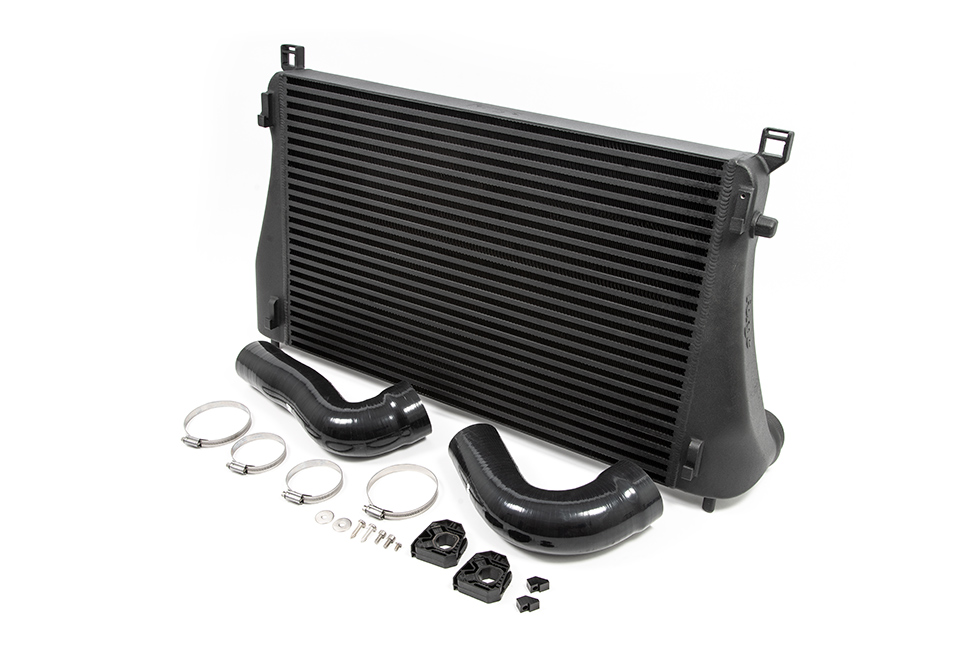



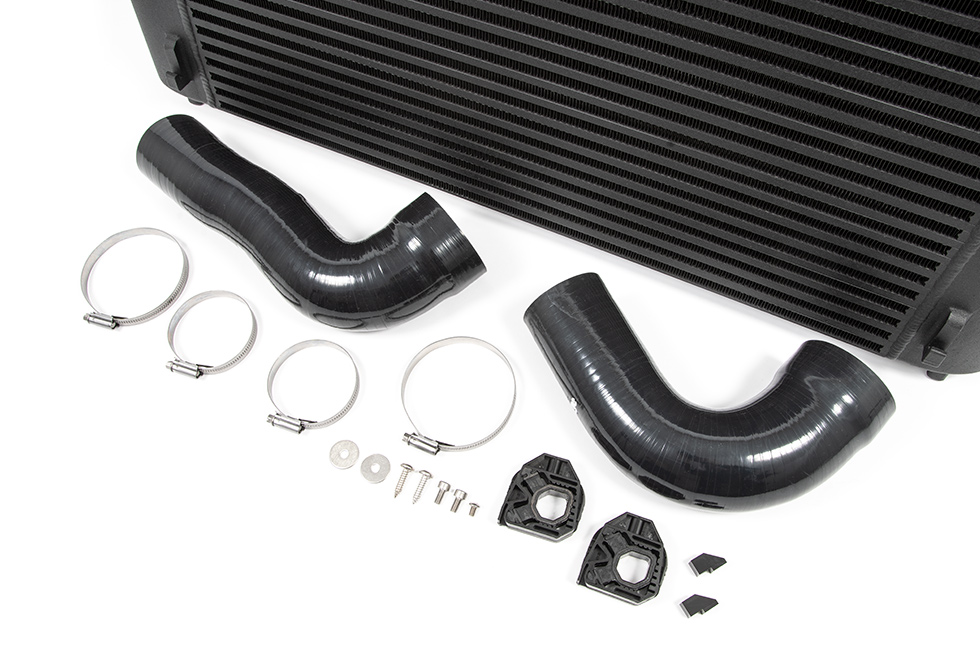
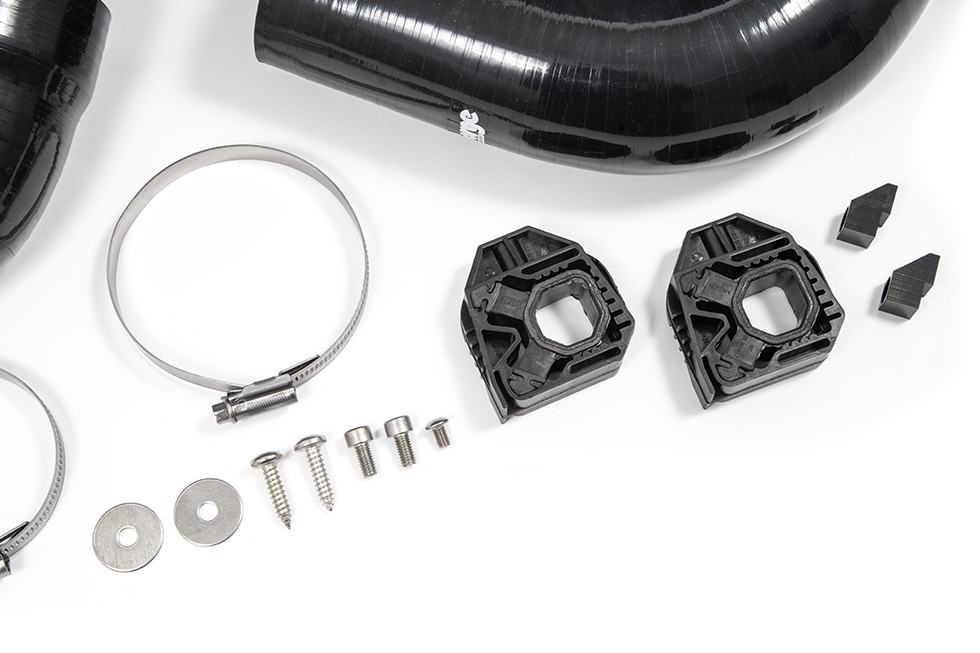
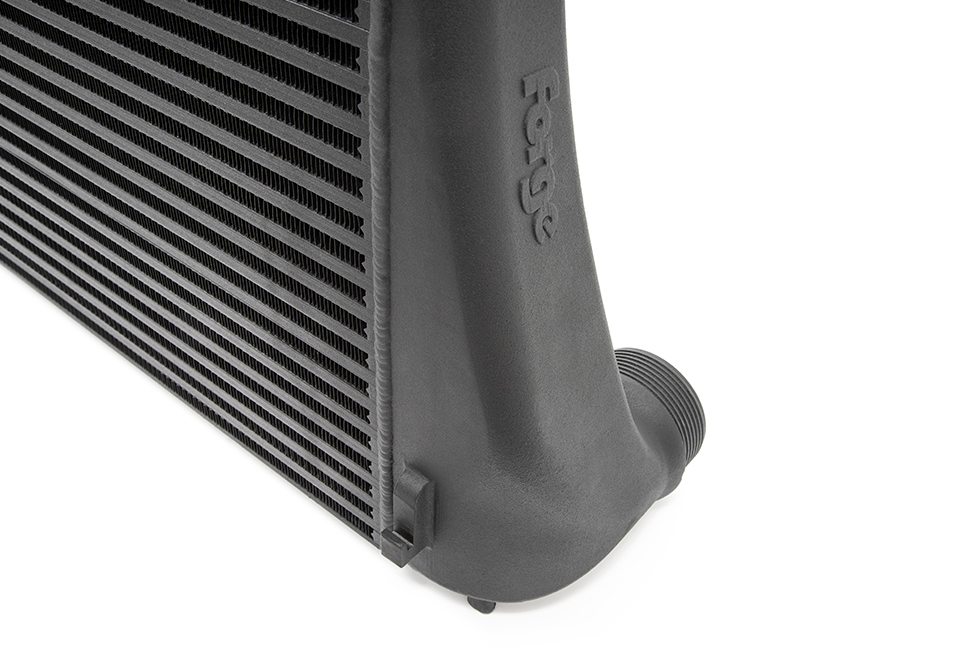
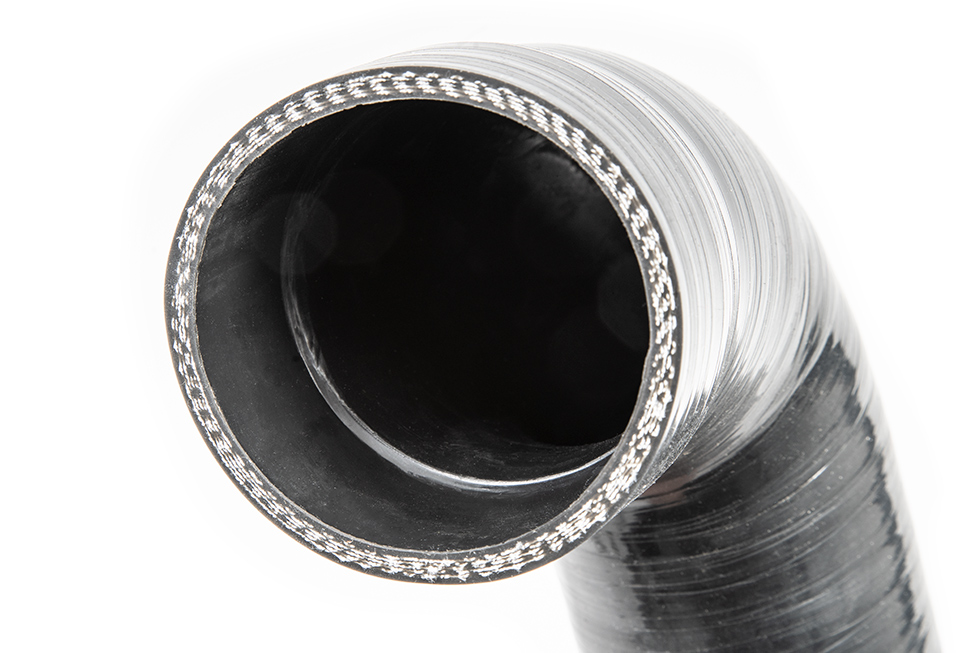







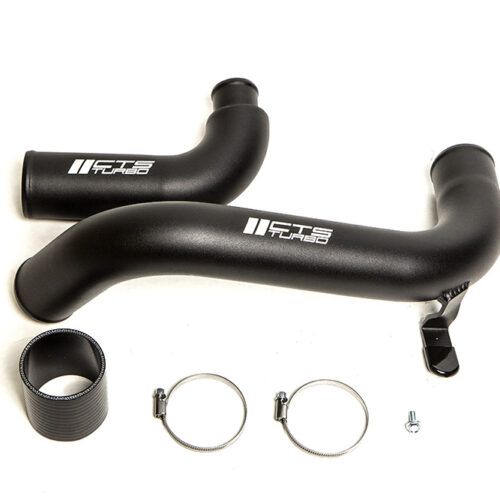


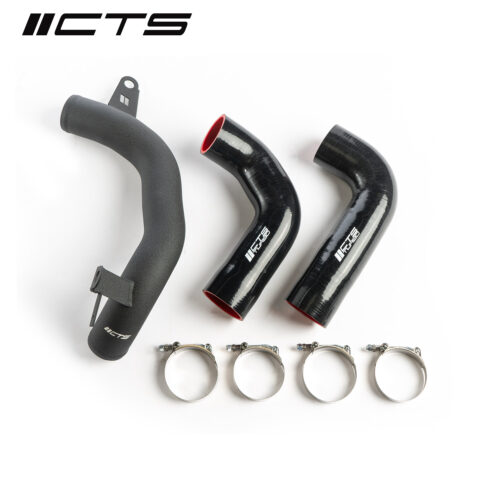
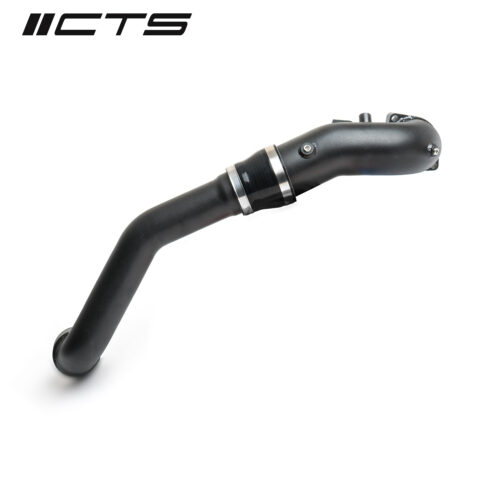
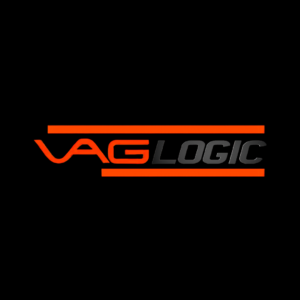

Reviews
There are no reviews yet.